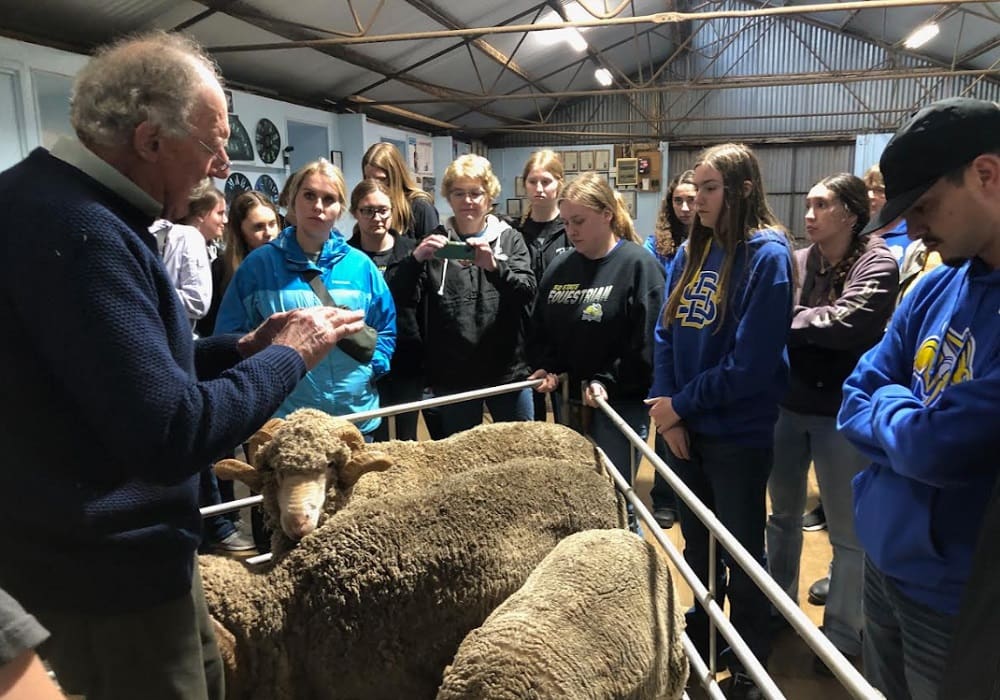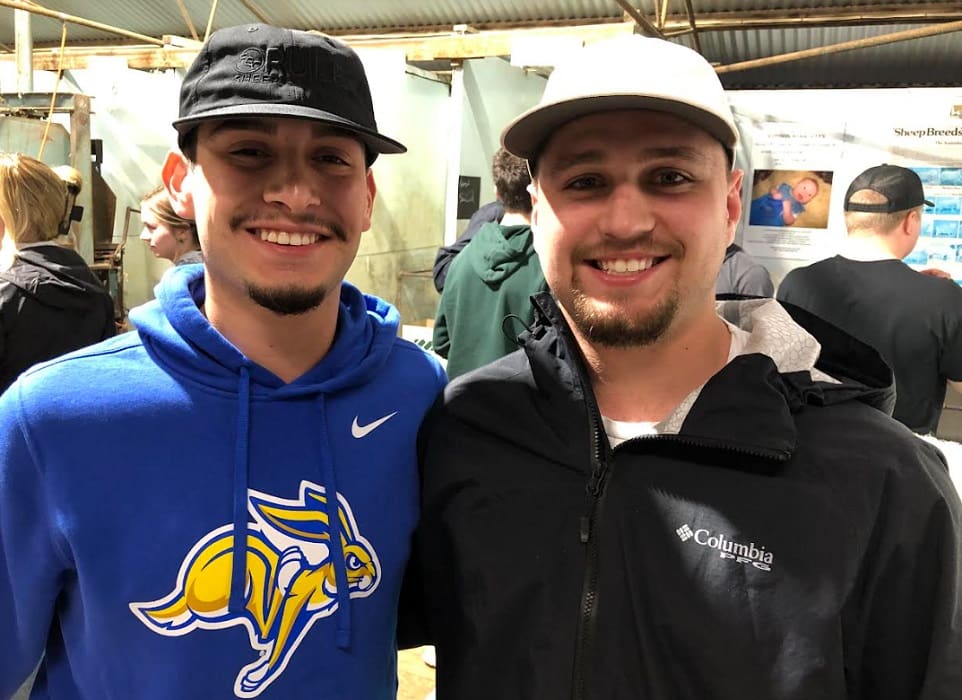
Hamilton wool grower Michael Blake explains Merino wool and sire selection.
VISITING American agriculture students got an insight into Australia’s sheep, wool, beef and dairy industries this month and shared some social licence insights.
Sheep Central caught up with the 33-strong South Dakota State University group at Michael and Cathy Blake property, Ballyglunin Park, north of Hamilton midway through their 14-day tour.
SDS ag business major students and Minnesota sheep farmers Kaden Nelson and Jerson Kopka are heavily involved in producing ‘market’ lambs for the 4-H and FFA lamb project in their state. They sell the Suffolk-Hampshire cross lambs to students to grow and prepare them for showing at state and county fairs, after which they are sold to finance their college education.
Kaden has a flock of about 20 ewes and Jerson’s flock is smaller, but he works for some big US breeders supplying the show industry on a larger scale, some with 2500-4000 sheep.
Jerson said the ‘market’ lambs at shows help educate the general public about sheep and the industry.
“The majority of the large state fairs are in a large city and the crowd that comes to the shows don’t know what’s going on, they come to see the animals and they see the love and the care that we have for these animals and it might change their perspective.
“When they see us as youths preparing these animals for months in advance putting countless hours in the barn working with them, making them look like show ponies essentially, and that could change their perspective,” Jerson said.
Lambs are valued for having good structure, high-headed and flat in their spine when they move.
“And on top of that we build muscle.
“If they don’t have it we even have exercise programs and feed supplements to increase the muscle on the lambs,” Jerson said.
Presentation is last; the lambs must have wool growth on the legs or “shag” and tight hides.
“As you guys have bred to get rid of the wrinkles in the Merinos, well we have been breeding for that for a long time to get the hides very tight and very glossy and silky.
“It’s definitely a labour of love,” he said.

SDSU students Jerson Kopka, left, and Kaden Nelson, in the Ballglunin Park wool shed.
Kaden said some of the stud rams have sold for around US$500,000 and often investors will take a half interest in an animal with potential to sell the semen to other breeders. He said market lambs have sold for $15,000-$16,000.
“It’s super competitive.”
The students said they hoped to establish a career in the market lamb business, but both are also working jobs in ag finance.
SDSU animal science professor Rosie Nold said America exported 20 percent of its ag products compared to Australia’s exporting more than 70pc. The students got insights into how Australia overcame its export issues and how global the world is, she said.
Some of the students – from freshmen to graduates — had never been on a plane before or out of the United States, she said.
“So the reality is getting them out of their comfort zone, seeing how things are different.”
Ms Nold was on her 12th trip with the university groups and has also travelled to New Zealand, Uruguay, Argentina and South Africa.
“It really opens the kid’s eyes.”
Other stops on the tour included Midfield Union Dairy at Woolsthorpe and abattoir in Warrnambool, and visits to beef, dairy and other sheep operations.
Assisting Professor Nold was Professor and SDSU beef extension specialist Julie Walker, who said the students found the automation in the meat plant interesting and the wool at the Blake’s property.
“I would say this is probably the highest quality wool that I have ever seen.”
Michael Blake showed the students a range of woolen and next-skin-garments, outlined the quality assurance systems behind Australian wool and the selection of Merino rams.
“This was the first visit from South Dakota State University students post-COVID and their second prior to COVID to Bally Glunin Park.
“Previously Ohio State University used to visit on a yearly basis,” he said.
“I always find the students have an eagerness to learn and I generally find out something I didn’t know as well.
“One important thing I learnt was that there are no discounts at slaughter for entire males.”

SDSU animal science professor Rosie Nold said America exported 20 percent of its ag products compared to Australia’s exporting more than 70pc. The students got insights into how Australia overcame its export issues and how global the world is, she said.
Australia has not overcome any export issues. Australia has a government that does not even know what the issues are….. let alone know a way to solve them. The live sheep trade is a good example. The federal government, MLA. What a mess.